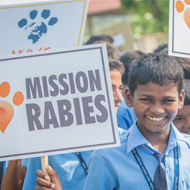
Mission Rabies will launch its Malawi programme in May
The past year has been amazing for Mission Rabies!" said Kate Shervell, international director of Mission Rabies, at the BSAVA Congress in Birmingham.
"Thanks to the development of our Rabies App, we now have the perfect tool to effectively run our established projects and upcoming projects in Malawi, Namibia and Uganda."
It has been one year since the launch of Mission Rabies' enormous effort to rid the Indian State of Goa from rabies. Having surpassed its initial target of vaccinating and sterilising 20,000 dogs in just six months, Mission Rabies teams are continuing to work hard to protect the dogs and people of Goa from this vicious disease.
The next challenge for the charity is to take the Mission Rabies programme to Africa. Based on the four elements of the project: dog vaccination, rabies surveillance, animal birth control programmes and education, Mission Rabies will launch its Malawi programme in May in Blantyre - a city with the highest reported child deaths due to rabies. Further campaigns will be launched in Uganda (July) and Namibia in August.
Having witnessed the devastating effect of rabies on animals and people during his time volunteering, Luke Gamble, CEO of Worldwide Veterinary Service, launched Mission Rabies in 2013.
Since the project began, Mission Rabies has managed to vaccinate over 150,000 dogs, with the help of local and international volunteers. The charity have also educated more than 200,000 children about rabies risk reduction and trained more than 70 Indian veterinary surgeons in humane Animal Birth Control (ABC) techniques.
More information about Mission Rabies, its future projects and how to become a volunteer can be found at www.missionrabies.com.
Image (C) Mission Rabies



 The latest
The latest